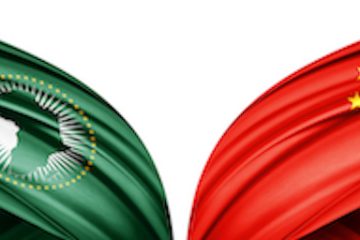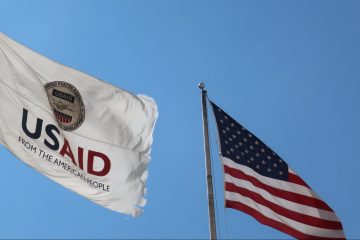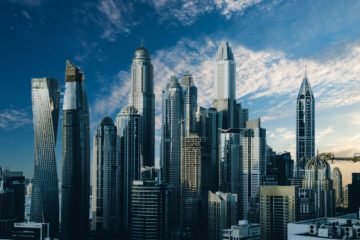
OxPol Blogcast. Politics, Re-Imagined — Displacement and the World Economy with Alexander Betts
How can we ensure that displaced people live in safety and dignity and create a policy that is sustainable at the same time? In this episode, we speak to Dr. Alexander Betts, the Leopold Muller Professor of Forced Migration and International Affairs at the Refugee Studies Centre, and the Director of the Refugee Economies Programme, both at the University of Oxford. Alexander has written extensively on the political economy of refugee protection — highlighting how displaced people can access and contribute to economies worldwide. Politics, Re-Imagined is a series by the Department of Politics and International Relations (DPIR) at the University of Oxford focused on exploring tangible and sustainable solutions to the most pressing challenges facing humanity today. Listen on:

Bridging State Responsibility and Opportunities as African Countries Join in the Digital Silk Road
In 2015 China launched the Digital Silk Road (DSR hereafter). The DSR is an essential part of the One Belt, One Road (BRI) strategy with significant domestic and foreign policy objectives. China has made enormous investments that have allowed it to achieve rapid technological advancement and economic growth. As of 2021, Chinese firms were three of the world’s largest technology companies by revenue. According to the World Intellectual Property Organisation (WIPO), in 2020 China reported 1.5 million patent applications, 2.5 times more than the second leading country, the United States. The DSR is part of China’s plan to spread its technical and proprietary knowledge by building telecommunications, data, and financial infrastructure in countries participating in the BRI. The Nigerian digital …

A New Direction for US Democracy Promotion?
As a prominent global aid donor, democracy promotion has distinctively shaped U.S. foreign assistance activities. Democracy aid has been a prominent theme of U.S. foreign assistance since the Marshall Plan. More recently, between 2001 and 2015, the U.S. annually disbursed $18 billion on average in democracy and governance aid, which represents (on average) 43% of the total U.S. foreign aid budget (calculated by the author from U.S. Government data and including Department of Defence figures). Nevertheless, the relationship between institutions and aid is complex and disputed. Scholars argue that inclusive and equitable institutions underpin economic growth and catalyse foreign assistance. Yet aid may also feed back on institutions, strengthening, weakening, or consolidating them. In December 2021, President Biden reflected on …
OxPol Blogcast Episode 7: Latin America’s Emerging Debt Crisis
Welcome to the OxPol Blogcast, a podcast where we will be sharing research, analysis, and experiences from members of the University of Oxford’s Department of Politics and International Relations. On each, episode we will talk to a guest about a piece they’ve written for the OxPol Blog. Then, we’ll discuss their larger research agenda, their insights on conducting political science, and their time at Oxford. On this episode of the OxPol BlogCast, host Chase Harrison talks to DPhil student Christoph Sponsel about Colombia’s credit rating, the Latin American debt crisis of the 1980s, and doing work at the intersection of political science and economics. Read the original blog post here: https://blog.politics.ox.ac.uk/colombian-mass-protests-foretelling-an-emerging-latin-american-debt-crisis/
Colombian Mass Protests: Foretelling an Emerging Latin American Debt Crisis?
S&P, a global credit rating agency, recently downgraded Colombia’s credit rating to a non-investment grade, implying that Colombian government bonds are now high-risk financial assets. The downgrade hit the country amid a wave of mass unrest. For over a month, Colombians spanning all strata of society protested in large numbers. Sparked initially by opposition to a government-proposed tax reform, which President Ivan Duque soon retracted, protesters expressed diverse demands, including calling for the Duque administration to resign, a series of social and economic reforms, a thorough implementation of Colombia’s 2016 peace agreement, and an end to police brutality. Protesters thus have called for nothing less than a complete overhaul of Colombia’s political and economic system. The protests form part of …
Plastic Pollution is Outpacing our Ability to Manage It
Actors around the world have taken up increasingly ambitious strategies to tackle plastic pollution: public-private partnerships like the Circulate Capital Ocean Fund; European Union strategies like banning commonly used- single-use products; and large international conferences like Our Oceans. Still, plastic waste remains a tangible and prominent environmental issue. Policymakers are wondering if the current spate of solutions will be enough to bring us to mitigate plastic waste effectively. In this article, I will examine how much and what kind of effort would be needed to significantly reduce plastic pollution emissions. I leveraged research from The Plastic Pollution Emissions Working Group (PPEG). The PPEG—a team of scientists, policy wonks, and practitioners working together under a grant from the National Socio-Environmental Synthesis …

Is The Charter Cities Moment Here?
In 2009, Nobel Prize laureate and former Chief Economist of the World Bank Paul Romer proposed the concept of ‘charter cities.’ In contrast to special economic zones, charter cities were envisaged as quasi-sovereign units located within existing states which were to be maintained by a foreign guarantor nation or nations. This arrangement would not merely construct a separate economic framework for the designated territory, but also establish a legal and political system autonomous from the host state. This, Romer believed, would create city-scale epicentres to stimulate economic development within the Global South. This piece examines Romer’s project and questions the immediate feasibility of such a project by taking into account the ‘stickiness’ of ideas regarding the territorial sovereign state. Since 2009, the idea of charter …
Mongolia’s Debt Overhang Amidst a Pandemic
As the economic effects of the COVID-19 pandemic unfold, the most severe casualties of “The Great Lockdown” are resource-dependent economies with limited institutional capacity to respond to the crisis. Their supply chains have been cut off, their markets are disrupted, and their investors are crowding out. Many of these countries have high external debt and an obligation to repay it in the medium term or they will face the trilemma of registering a double-digit growth, accruing further debt, or defaulting. Come 2021, Mongolia, a superlatively resource-dependent economy, will be at the center of this trilemma. The immediate cause of Mongolia’s current state is its inconsistent fiscal expenditure and its undiversified mining economy. Over the years, fiscal mismanagement of the previous …









